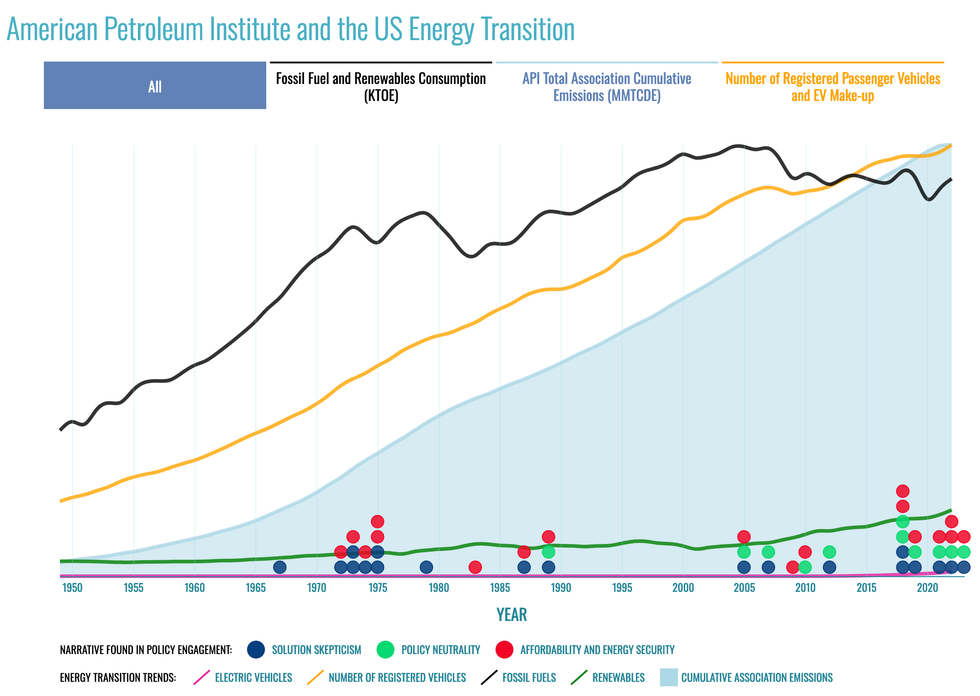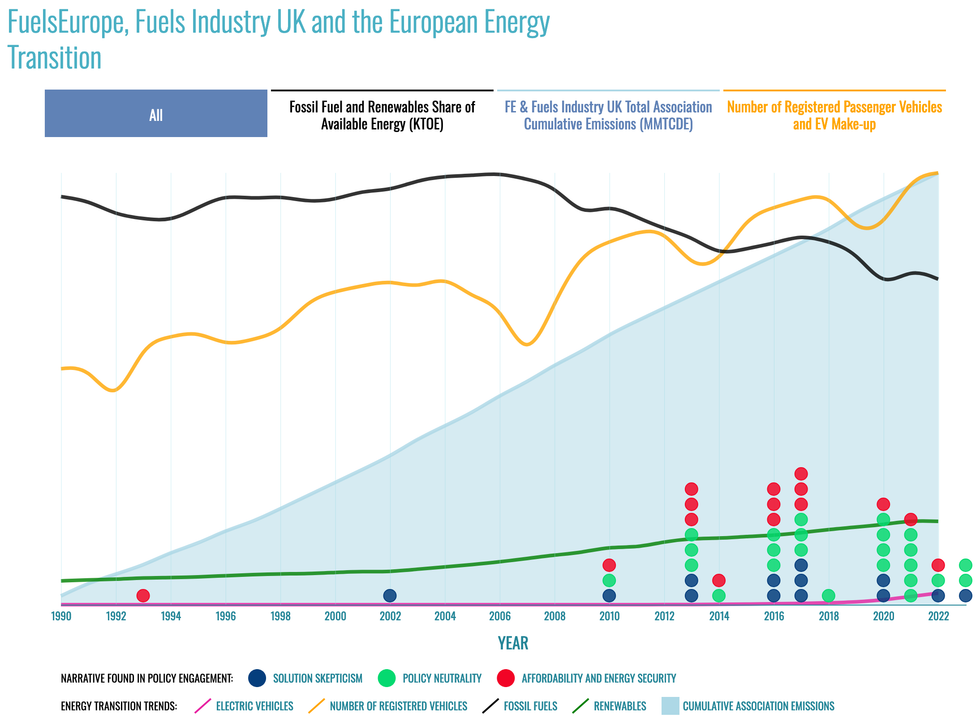

SUBSCRIBE TO OUR FREE NEWSLETTER
Daily news & progressive opinion—funded by the people, not the corporations—delivered straight to your inbox.
5
#000000
#FFFFFF
To donate by check, phone, or other method, see our More Ways to Give page.


Daily news & progressive opinion—funded by the people, not the corporations—delivered straight to your inbox.

An oil refinery is shown at dusk in Thailand.
Climate campaigners said the "brilliant and disturbing" publication "shows the crucial need for increased awareness of the delaying tactics of fossil fuel companies."
Echoing years of academic, congressional, and journalistic research, a U.K.-based think tank on Thursday released a report detailing how top fossil fuel industry trade groups have "used a playbook of narratives and arguments to systematically oppose, weaken, and delay the transition to renewables and electric vehicles (EVs) since at least 1967."
The new InfluenceMap analysis focuses on the American Petroleum Institute (API), FuelsEurope, and Fuels Industry U.K.—whose spokespeople responded to the report by insisting to SustainableViews that the oil and gas industry is playing an "essential" role in the transition and it is necessary to harness "vast energy resources, from oil and natural gas to renewables."
Meanwhile, InfluenceMap's report calls out the organizations for their use of three narratives over the past five decades that "has likely contributed to delaying the energy transition and continues to pose a serious threat to policy progress on climate change."
"Between 1950 and 2022, the members of these associations have a combined contribution of approximately 350 billion tons of greenhouse gas emissions, accounting for approximately 18% of the world's total cumulative CO2 emissions from fossil fuels and industry," the report notes.
InfluenceMap traced the narratives "across 51 separate instances of the associations' advocacy against fossil fuel alternatives between 1967 and 2023," the publication explains. "These narratives include 'Solution Skepticism,' which has been in use for 56 years, 'Policy Neutrality' for 34 years, and 'Affordability and Energy Security' for 51 years."
The group defined the narratives as follows:
"Despite advancements in understanding the threats posed by the climate crisis, these narratives persist as of 2023," the report says. It also emphasizes that the narratives contradict science-based policy recommendations from the United Nations' Intergovernmental Panel on Climate Change (IPCC) and the International Energy Association (IEA).
Some examples identified by InfluenceMap include API comments on the Clean Air Act and amendments in 1967, 1970, and 1989 as well as the association's remarks on the Inflation Reduction Act of 2022 and pollution standards for heavy-duty vehicles last year. The publication also points to FuelsEurope's 2021 comments on European Union Performance Standards and the group's participation in a 2022 letter about the Energy Performance of Buildings Directive.
InfluenceMap produced graphics to display its findings, including one that shows key members of each association as of March. Members of all three include BP, ExxonMobil, Shell, and Phillips 66.
"Some of the world's largest oil and gas companies are still paying a high premium to participate in industry associations that may no longer represent them on climate policy," the report states, pointing to how associations' actions contrast with public positions taken by some major fossil fuel corporations. "Meanwhile, Shell, Chevron, and Exxon have disclosed that they pay between $5 million and $12.5 million per year to hold a membership with the API."
The think tank also made a pair of graphics showing how the trade associations' documented use of the three narratives aligns with fossil fuel and renewables consumption, association members' cumulative emissions, and the number of EVs compared with the total number of registered passenger vehicles since the 1950s.


"This report shows that even faced with mounting scientific evidence over decades, the oil and gas industry have pushed ahead with a damaging messaging strategy they developed as early as the 1960s," said Tessa Khan, founder and executive director of Uplift, which supports a rapid and fair transition away from fossil fuel production in the U.K.
"It shows the crucial need for increased awareness of the delaying tactics of fossil fuel companies from policymakers if they are to successfully drive the energy transition forward at the pace we need," Khan added.
Calling the report "brilliant and disturbing," the U.K.-based Fossil Free Parliament said that "this is exactly why we need to remove the industry's seat at the table in Westminster."
In the United States, Democratic federal lawmakers recently concluded a probe into BP, Chevron, ExxonMobil, Shell, API, and the U.S. Chamber of Commerce for decades of spreading climate disinformation, after which they urged the U.S. Department of Justice to investigate all six.
Trump and Musk are on an unconstitutional rampage, aiming for virtually every corner of the federal government. These two right-wing billionaires are targeting nurses, scientists, teachers, daycare providers, judges, veterans, air traffic controllers, and nuclear safety inspectors. No one is safe. The food stamps program, Social Security, Medicare, and Medicaid are next. It’s an unprecedented disaster and a five-alarm fire, but there will be a reckoning. The people did not vote for this. The American people do not want this dystopian hellscape that hides behind claims of “efficiency.” Still, in reality, it is all a giveaway to corporate interests and the libertarian dreams of far-right oligarchs like Musk. Common Dreams is playing a vital role by reporting day and night on this orgy of corruption and greed, as well as what everyday people can do to organize and fight back. As a people-powered nonprofit news outlet, we cover issues the corporate media never will, but we can only continue with our readers’ support. |
Echoing years of academic, congressional, and journalistic research, a U.K.-based think tank on Thursday released a report detailing how top fossil fuel industry trade groups have "used a playbook of narratives and arguments to systematically oppose, weaken, and delay the transition to renewables and electric vehicles (EVs) since at least 1967."
The new InfluenceMap analysis focuses on the American Petroleum Institute (API), FuelsEurope, and Fuels Industry U.K.—whose spokespeople responded to the report by insisting to SustainableViews that the oil and gas industry is playing an "essential" role in the transition and it is necessary to harness "vast energy resources, from oil and natural gas to renewables."
Meanwhile, InfluenceMap's report calls out the organizations for their use of three narratives over the past five decades that "has likely contributed to delaying the energy transition and continues to pose a serious threat to policy progress on climate change."
"Between 1950 and 2022, the members of these associations have a combined contribution of approximately 350 billion tons of greenhouse gas emissions, accounting for approximately 18% of the world's total cumulative CO2 emissions from fossil fuels and industry," the report notes.
InfluenceMap traced the narratives "across 51 separate instances of the associations' advocacy against fossil fuel alternatives between 1967 and 2023," the publication explains. "These narratives include 'Solution Skepticism,' which has been in use for 56 years, 'Policy Neutrality' for 34 years, and 'Affordability and Energy Security' for 51 years."
The group defined the narratives as follows:
"Despite advancements in understanding the threats posed by the climate crisis, these narratives persist as of 2023," the report says. It also emphasizes that the narratives contradict science-based policy recommendations from the United Nations' Intergovernmental Panel on Climate Change (IPCC) and the International Energy Association (IEA).
Some examples identified by InfluenceMap include API comments on the Clean Air Act and amendments in 1967, 1970, and 1989 as well as the association's remarks on the Inflation Reduction Act of 2022 and pollution standards for heavy-duty vehicles last year. The publication also points to FuelsEurope's 2021 comments on European Union Performance Standards and the group's participation in a 2022 letter about the Energy Performance of Buildings Directive.
InfluenceMap produced graphics to display its findings, including one that shows key members of each association as of March. Members of all three include BP, ExxonMobil, Shell, and Phillips 66.
"Some of the world's largest oil and gas companies are still paying a high premium to participate in industry associations that may no longer represent them on climate policy," the report states, pointing to how associations' actions contrast with public positions taken by some major fossil fuel corporations. "Meanwhile, Shell, Chevron, and Exxon have disclosed that they pay between $5 million and $12.5 million per year to hold a membership with the API."
The think tank also made a pair of graphics showing how the trade associations' documented use of the three narratives aligns with fossil fuel and renewables consumption, association members' cumulative emissions, and the number of EVs compared with the total number of registered passenger vehicles since the 1950s.


"This report shows that even faced with mounting scientific evidence over decades, the oil and gas industry have pushed ahead with a damaging messaging strategy they developed as early as the 1960s," said Tessa Khan, founder and executive director of Uplift, which supports a rapid and fair transition away from fossil fuel production in the U.K.
"It shows the crucial need for increased awareness of the delaying tactics of fossil fuel companies from policymakers if they are to successfully drive the energy transition forward at the pace we need," Khan added.
Calling the report "brilliant and disturbing," the U.K.-based Fossil Free Parliament said that "this is exactly why we need to remove the industry's seat at the table in Westminster."
In the United States, Democratic federal lawmakers recently concluded a probe into BP, Chevron, ExxonMobil, Shell, API, and the U.S. Chamber of Commerce for decades of spreading climate disinformation, after which they urged the U.S. Department of Justice to investigate all six.
Echoing years of academic, congressional, and journalistic research, a U.K.-based think tank on Thursday released a report detailing how top fossil fuel industry trade groups have "used a playbook of narratives and arguments to systematically oppose, weaken, and delay the transition to renewables and electric vehicles (EVs) since at least 1967."
The new InfluenceMap analysis focuses on the American Petroleum Institute (API), FuelsEurope, and Fuels Industry U.K.—whose spokespeople responded to the report by insisting to SustainableViews that the oil and gas industry is playing an "essential" role in the transition and it is necessary to harness "vast energy resources, from oil and natural gas to renewables."
Meanwhile, InfluenceMap's report calls out the organizations for their use of three narratives over the past five decades that "has likely contributed to delaying the energy transition and continues to pose a serious threat to policy progress on climate change."
"Between 1950 and 2022, the members of these associations have a combined contribution of approximately 350 billion tons of greenhouse gas emissions, accounting for approximately 18% of the world's total cumulative CO2 emissions from fossil fuels and industry," the report notes.
InfluenceMap traced the narratives "across 51 separate instances of the associations' advocacy against fossil fuel alternatives between 1967 and 2023," the publication explains. "These narratives include 'Solution Skepticism,' which has been in use for 56 years, 'Policy Neutrality' for 34 years, and 'Affordability and Energy Security' for 51 years."
The group defined the narratives as follows:
"Despite advancements in understanding the threats posed by the climate crisis, these narratives persist as of 2023," the report says. It also emphasizes that the narratives contradict science-based policy recommendations from the United Nations' Intergovernmental Panel on Climate Change (IPCC) and the International Energy Association (IEA).
Some examples identified by InfluenceMap include API comments on the Clean Air Act and amendments in 1967, 1970, and 1989 as well as the association's remarks on the Inflation Reduction Act of 2022 and pollution standards for heavy-duty vehicles last year. The publication also points to FuelsEurope's 2021 comments on European Union Performance Standards and the group's participation in a 2022 letter about the Energy Performance of Buildings Directive.
InfluenceMap produced graphics to display its findings, including one that shows key members of each association as of March. Members of all three include BP, ExxonMobil, Shell, and Phillips 66.
"Some of the world's largest oil and gas companies are still paying a high premium to participate in industry associations that may no longer represent them on climate policy," the report states, pointing to how associations' actions contrast with public positions taken by some major fossil fuel corporations. "Meanwhile, Shell, Chevron, and Exxon have disclosed that they pay between $5 million and $12.5 million per year to hold a membership with the API."
The think tank also made a pair of graphics showing how the trade associations' documented use of the three narratives aligns with fossil fuel and renewables consumption, association members' cumulative emissions, and the number of EVs compared with the total number of registered passenger vehicles since the 1950s.


"This report shows that even faced with mounting scientific evidence over decades, the oil and gas industry have pushed ahead with a damaging messaging strategy they developed as early as the 1960s," said Tessa Khan, founder and executive director of Uplift, which supports a rapid and fair transition away from fossil fuel production in the U.K.
"It shows the crucial need for increased awareness of the delaying tactics of fossil fuel companies from policymakers if they are to successfully drive the energy transition forward at the pace we need," Khan added.
Calling the report "brilliant and disturbing," the U.K.-based Fossil Free Parliament said that "this is exactly why we need to remove the industry's seat at the table in Westminster."
In the United States, Democratic federal lawmakers recently concluded a probe into BP, Chevron, ExxonMobil, Shell, API, and the U.S. Chamber of Commerce for decades of spreading climate disinformation, after which they urged the U.S. Department of Justice to investigate all six.